Mass Arrest Of Female Activists In Iran Following Teenager’s Killing

In the aftermath of the government-related killing of Armita Gervanad, more than 20 women activists and journalists have reportedly been arrested in Gilan, north of Iran.

In the aftermath of the government-related killing of Armita Gervanad, more than 20 women activists and journalists have reportedly been arrested in Gilan, north of Iran.
Armita Geravand,16, died after an altercation with hijab police led to her falling into a coma. She later died in hospital in echoes of the death of Mahsa Amini last year, whose death triggered a nationwide uprising.
The detainees include notable figures such as animal rights activists Rozita Rajaei and writer, and civil activist Nina Golestani. Additionally, environmental journalists and activists Haleh Nateghi and Nasim Tavaf are among those detained.
Informed sources indicate that the women are being detained by the Islamic Revolutionary Guard Corps (IRGC) accused of "conspiracy against national security" and "propaganda against the system." Families, despite their presence in the public and revolutionary court of Rasht, remain uninformed about the case details.
As of now, none of the detainees have been able to appoint a lawyer, and they are currently held in Lakan Prison in Rasht. This marks the second "mass arrest" of female activists in Gilan, following the recent uprising against the Islamic Republic.
Beyond Gilan, women activists in Tehran, Isfahan, and Tabriz have received summonses or been detained by the IRGC. The current situation of the detainees remains unknown.
Journalist and women's rights activist Manijeh Moazzen in Tehran was also arrested on November 8. Additionally, there are reports of the recent arrests of activists Mahnaz Tarah and Shaghayegh Moradi, with no information available about their whereabouts and conditions.
During the recent funeral of Armita, 62 women were reportedly detained and transferred to Evin and Gharchak prisons in Tehran.
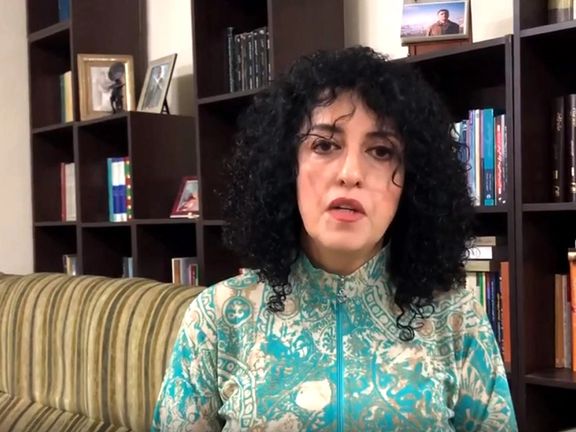
Narges Mohammadi, the imprisoned Nobel Peace Prize laureate, was once again denied medical care for refusing to wear the mandatory hijab.
In a post on her Instagram, an audio file was shared in which female prisoners chant, "Prisoners, Support, Support!"
Originally scheduled for a cardiac angioplasty on Wednesday, Narges Mohammadi's transfer from Evin Prison to the hospital was thwarted, citing her refusal to comply with mandatory hijab, a position she has stood firm on during her years in and out of detention.
Medical tests conducted last week revealed Mohammadi's critical health condition, including "blockage in two heart arteries, fluid accumulation around the heart, and severe inflammation of the gallbladder."
Mohammadi had previously reported her transfer to the hospital on November 8, without a headscarf and wearing a business suit. However, she returned to prison shortly afterward.
Since November 6, Mohammadi had been on a hunger strike in protest against the "Islamic Republic's policy of delaying medical attention for sick prisoners, risking the health and lives of human beings" and "the policy of death or compulsory hijab for Iranian women." She was refusing to comply with hijab laws in exchange for treatment.
Following her civil rights activism, Mohammadi was awarded the Nobel Peace Prize in 2023. International human rights organizations, including Reporters Without Borders, strongly condemned denying Mohammadi access to medical care, and the Nobel Committee expressed severe concern about her health.
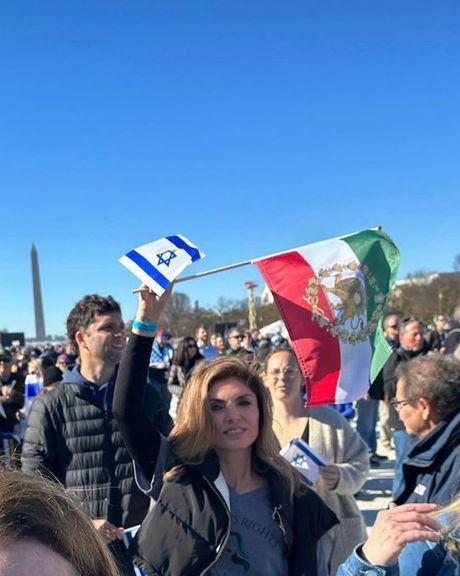
Iranian dissidents, including the exiled Crown Princess, were among demonstrators at a pro-Israel rally in Washington Tuesday to denounce anti-Semitism.
Protests and street demonstrations have erupted around the world on both sides since the Palestinian militant group Hamas mounted a surprise attack on Israel on October 7, killing at least 1,200 mostly civilians and taking at least 240 more hostage. It has since resulted in the most deadly war between the two sides since Hamas took power in 2007.
Iranians have shared their images on social media to demonstrate their presence at the Washington gathering. Among the protesters was the wife of the exiled prince of Iran, Yasmine Pahlavi.
At a recent football match in Tehran, hundreds of Iranian fans chanted for the removal of Palestinian flags displayed at the stadium.
While rampaging and burning American and Israeli flags in Iran is a part of state-sponsored activities, it has been captured on video that university students move to avoid stepping on painted American and Israeli flags placed on the ground by officials.
During protests, "Neither Gaza nor Lebanon, My Life for Iran" has been a common slogan as people voice their concern that while Iran's economic situation is deteriorating, the regime continues to financially sponsor terrorist groups in the region.

The Iranian regime continues its crackdown on dissidents, targeting women’s rights, labor and union activists, environmentalists, and religious minorities in recent weeks.
In the past week alone, there have been reports of the arrests of two female former political prisoners in Tehran, two female environmental activists and journalists as well as two female writers, and a female animals rights activist in Rasht, two male citizens in Izeh who participated in the anniversary ceremonies for two of last year’s protest victims – nine-year-old Kian Pir-Falak and sixteen-year-old Milad Saeedianjou – as well as the latter’s sister in the same city and several others elsewhere.
Security forces who raided the home of female journalist and former political prisoner Shaghayegh Moradi in Tehran on Monday morning seized some of her personal belongings and took her with them to her mother’s house to search the premises. It is not clear which security body is responsible for the arrest and where she is being kept.
Mahnaz Tarrah, former political prisoner, however, was violently arrested on the street and taken to a court stationed at Evin Prison.
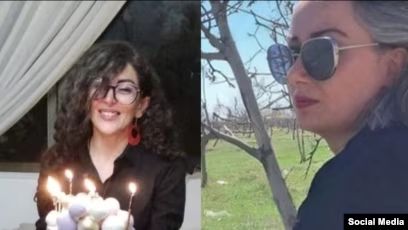
Farzin Rezaei-Roshan, also a former political prisoner, who was with Tarrah at the time of her arrest said in a video he released on social media that he was violently assaulted by the over a dozen agents who arrested his friend.
Rezaei-Roshan who is seen in the video in bloodied clothes says the agents used tasers and broke his head before taking his friend away.
In Rasht, capital of the northern province of Gilan, writer Rozita Rajaei was arrested Saturday and journalists Nasim Tavafzadeh and Helaleh Nategheh were arrested two days later. Both journalists had carried out research and written extensively about waste management, a big environmental problem in the region.
Like most other cases, there is very little information on these arrests in Rasht, but writer Nina Golestani’s husband said in an Instagram post that his wife was arrested by the Revolutionary Guards’ intelligence organization on her way home from shopping.
Due to censorship regulations, the mainstream media in Iran do not report on the majority of dissidents’ and activists’ arrests, which often involve unnecessary violence and maltreatment as well as confiscation of computers and mobile phones of not only the person being arrested, but of all other members of the family.
Information including reason for arrest and place of detention is often withheld even from the families of detainees by the authorities.
Social media users, however, actively inform the public of the arrests the regime strives to hide from the public and its human rights violations.
Pressure has also been high on Sunnis and followers of the Baha’i and Yarsan (Ahl-i Haqq) faiths that the regime does not recognize and considers as heretical unlike Christianity, Judaism and Zoroastrianism which have legal status in the Constitution.
The homes of the followers of the Baha’i faith, the largest non-Muslim religious minority in Iran, who have been persecuted since the Islamic Revolution of 1979 were raided in these cities by armed security agents last week with at least 19 people arrested and their personal belongings including electronic devices impounded.
The recent arrests have raised the number of Bahai’s arrested in the past month to at least 32 all of whom are still in prison.
The four members of the mystical Yarsan faith’s advisory council arrested in Kermanshah Province on Friday were reportedly freed after a few hours of interrogation but there is very little information on a Sunni cleric Abdulhakim Shahbakhsh who was arrested by security forces in Zahedan on November 8.
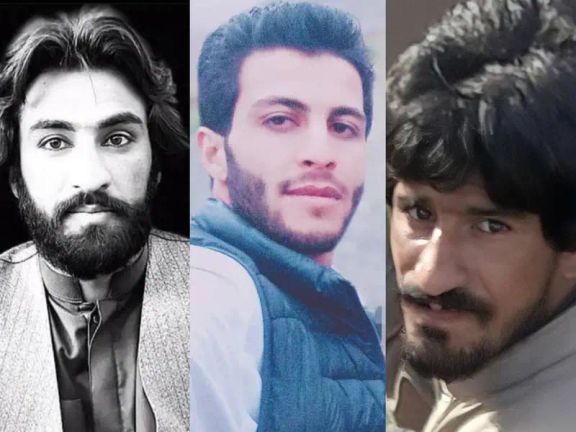
Three political prisoners were executed on Tuesday at Zahedan prison in Iran’s southeastern Sistan-Baluchistan province, which has a majority Sunni population.
Mizan News Agency affiliated with Iran’s notorious Judiciary made the announcement, as it has executed more than 100 inmates in the past one month.
The condemned political prisoners were charged with alleged "membership and collaboration with Jaish ul-Adl, receiving military training, transporting and concealing bomb-making materials, as well as participating in two bombing operations in Zahedan, an unsuccessful bombing in Zabol county, and two bombing operations in Zahedan's police station."
Jaish ul-Adl, a Sunni Islamist armed group, operates predominantly in southeastern Iran, where a significant Sunni Baluchi population resides, and the border with Pakistan is porous.
The detainees, apprehended by security forces in September 2020, underwent months of interrogation before being transferred to Zahedan prison.
Last Saturday, another political prisoner was also executed after enduring 12 years of imprisonment in the same facility.
Jaish ul-Adl promptly responded to the executions, characterizing them as "a sign of the weakness and incompetence of the regime of the Supreme Leader in confronting the movement of the people of Baluchestan for the realization of their legitimate rights," as stated on its Telegram channel and website.
In a parallel development, the Oslo-based Human Rights Organization of Iran released a report on Tuesday, documenting 114 executions in the country since the commencement of the conflict in Gaza. Of these, 24 were Baluch citizens, five of whom were sentenced to death for collaborating with armed groups opposing the Islamic Republic.
The 2022 execution statistics for Iran reveal that the Sistan-Baluchestan holds the highest per capita execution rate in the country, with 39 executions per one million people.
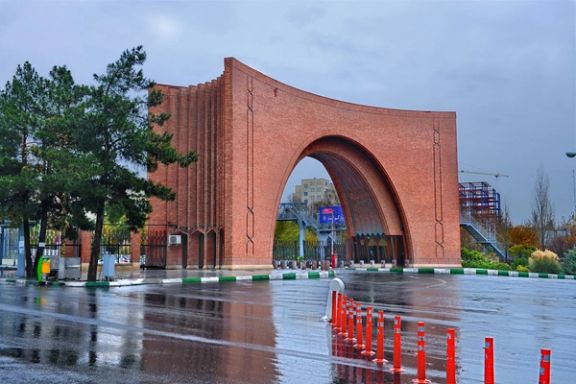
Tarbiat Modares University students in Tehran ended a two-day strike organized to protest harsh hijab enforcement and other campus restrictions by authorities.
According to the popular Telegram channel of the National Student Unions Council, Tarbiat Modares University students held their strike on Sunday and Monday under the slogan "End the Repression”.
Described as an "occupation" of the university, the document presented by the group details the oppression that the students feel as if it were a form of “martial law”. Since the suppression of protests last year, when security forces killed more than 500 civilians and arrested around 22,000 others, the authorities began cracking down on university students, who played a major role in the "Women, Life, Freedom” movement.
“Protesting and speaking out results in violence, insults, and disciplinary action," it said. "Every day we are harassed by the university security forces; insults, physical attacks, threats, and invasion of privacy are part of our daily lives."
The students believe the regime's behavior is intended to "scare, depress, and isolate” them so that their voices cannot be heard, the union claiming the regime's "goal is to silence us through force”.
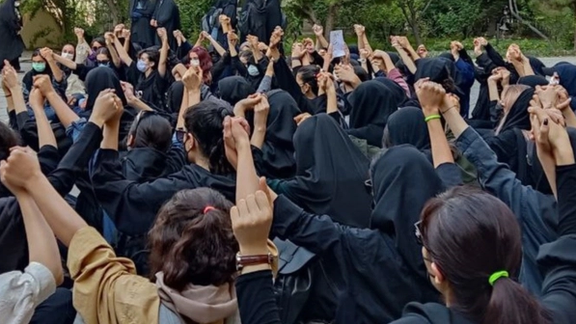
Activists say that since the beginning of the new academic year, Iran's universities have been experiencing severe security measures, which include "mass summons from intelligence and security agencies and disciplinary committees" as well as "temporary suspension" and "expulsion" orders issued to students and professors.
In their statement, the students outlined their demands. They stated that since students feel oppressed in the university environment, they propose that security forces stay away from the campus, remain at guard posts, and wear uniforms with their names on them.
Moreover, they want an end to the verbal and physical harassment of students, physical violence, phone calls, and filing of disciplinary complaints for the way students dress.
The students also demanded the overturning of new regulations governing student entry and exit from the university including gender-segregated gates.
Their statement states that the strike was the first step of an ongoing campaign and that they will continue protesting in various forms until their demands are met and university management and security make the necessary changes to make the university environment more conducive to students.
In the aftermath of last year's uprising in the wake of the death of Mahsa Amini in morality police custody, the harsh treatment of students has intensified.
A video was released on social media last week showing the head of the Faculty of Social Sciences of the University of Tehran attacking and insulting students, referring to the faculty as a "brothel" and the students as "prostitutes".
After the incident, students from another university, Tabatabai University Faculty of Social Sciences, issued a statement in support of the students who were insulted and said: "University officials have a fundamental hatred for knowledge and students."
After the backlash, Gholamreza Jamshidiha claimed that male and female students had been "kissing" and "shaking hands".
At the beginning of the current academic year, a joint statement by 12 university trade unions announced that after a year since the people's uprising, the student movement has entered a new phase of activism and resistance which will render the “government's repressive measures ineffective.”
As the new academic year approaches, "with the accumulation of experience and along the path of no return, it is time to reclaim and redefine the university as a place for building the future", it said.